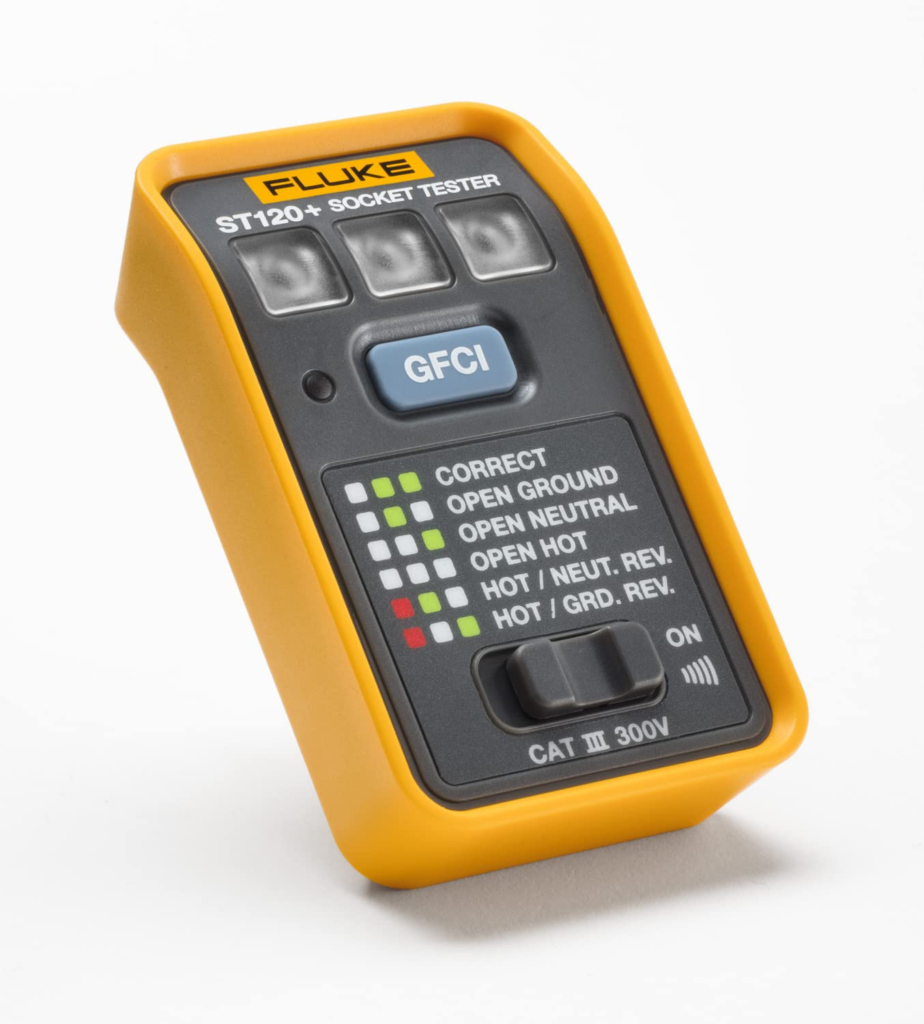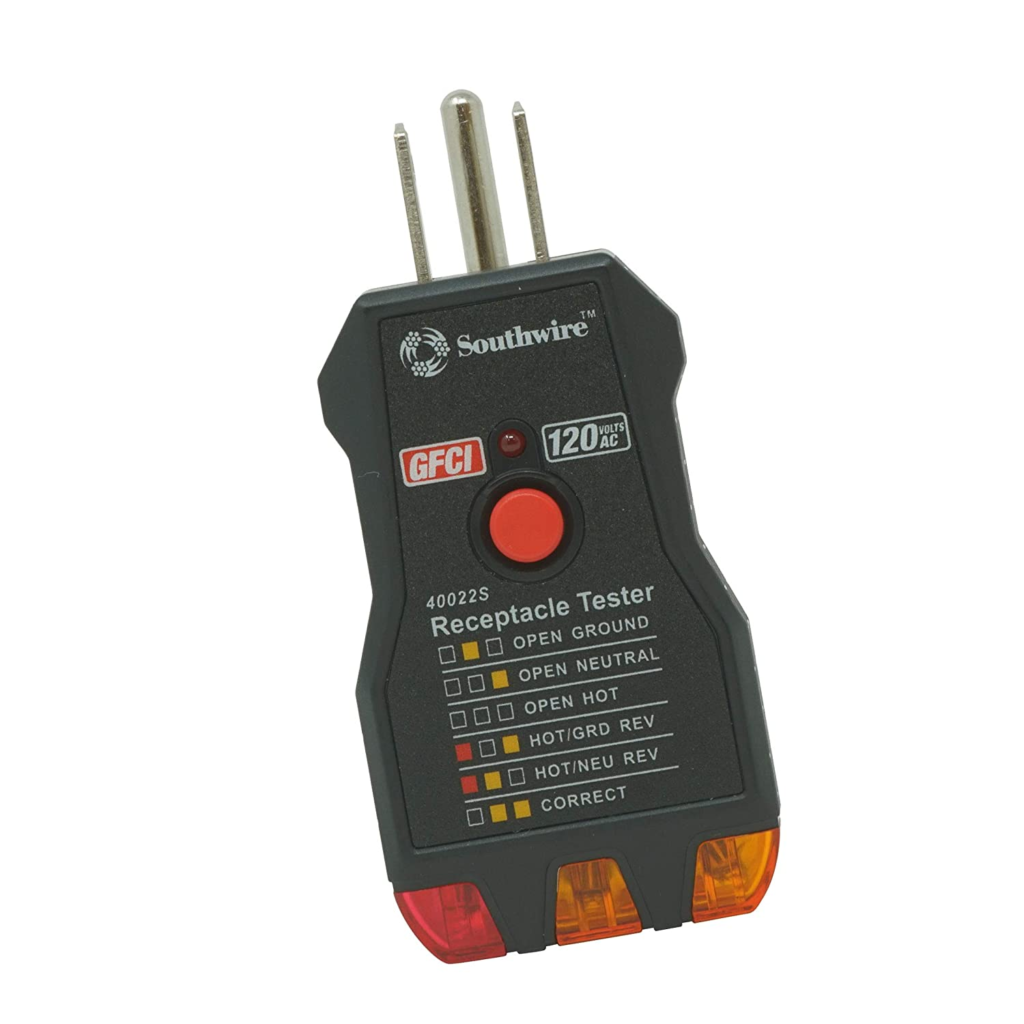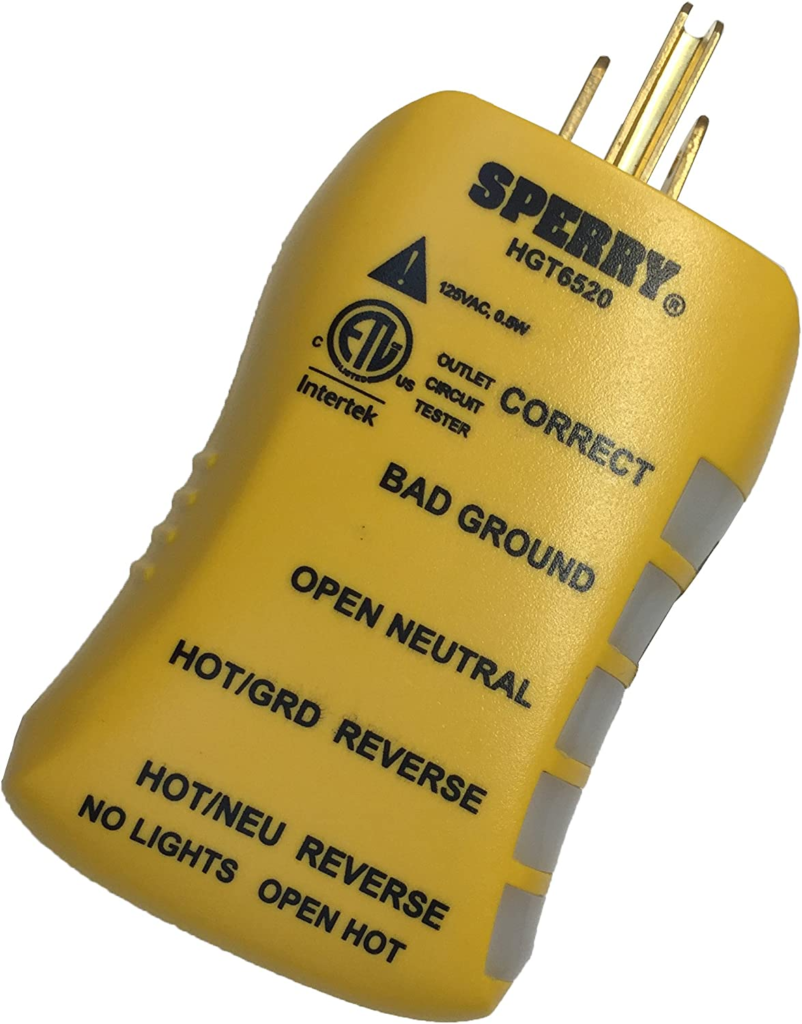Electrical outlet tester, receptacle tester, or electrical socket tester are different names of the same instrument, responsible for testing outlets for different problems. However, choosing the best socket tester (Outlet tester or Receptacle tester) among a variety is a tough job. Well, here we are to help.
Home wiring is a bit tricky when it comes to troubleshooting. Our first step would be to find the problem we are facing. Here I am showing a few scenarios, which could be troublesome:
- Neutral wire touches Earth wire
- Earth wire touches Live wire
- Live wire leak current to other nearby metals
- The socket fails to work
Besides, there are more situations that damage not only wiring but often claim precious lives; and we need a proper instrument to stay safe and solve wiring problems.
A socket tester is a handy instrument in dealing with home wiring; only if one gets a hand on the best one. Upon getting one, we can easily diagnose issues in home outlets. Hence, it is considered “First Aid” in troubleshooting home wiring. But there are varieties of socket testers in the market, which can perplex a person.
Then;
How to choose the best socket tester which suits our needs?
How to use it efficiently?
This is why you are reading this blog, through which I will share my experience to select the best socket tester.
Only if you follow up…
Best Socket testers
No matter if you are dealing with a normal socket or a GFCI one. As long as you have the right tester, the rest doesn’t matter that much.
The best socket testers that I and field professionals recommend are the Klein RT310, the Klein RT250, or the Sperry outlet tester. They are the best because they come from recognizable brands. Thousands of people have used them and are satisfied with the results. They are of high quality, reliable, and come with a decent price tag that almost anyone can afford.
In the rest of this article, I talk in more detail about mentioned best outlet tester.
But first, let’s see some parameters that make a socket best. Also, these parameters will help and guide you in making the right decision for your situation.
Choosing the right Socket Tester
The following are some aspects that can lead you to choose not only a socket tester but also one that is best for socket testing effectively.
a. Ratings
The rating of the socket tester means what voltage and current it can be used for safely. For example, we are dealing with 220V and a few amps of power, thus a 300V Outlet tester is fine for us.
b. Weight
It is also a prominent factor in looking forward to good socket testers. Heavy instruments can add more problems than they solve. Moreover, heavy socket testers could not be carried easily. Hence, weight is a measuring factor.
c. Cost
Again, it depends on the need. If our need is casual then we must buy a cheap socket tester and if we are using it as a professional, then we must jump to a costly (as compared to simple socket testers) socket tester.
However, we listed all categories below, and it would not be a concern to select among them. Thus, we must keep in mind the cost of the socket tester and our needs.
d. Usage
An ideal Socket tester must always be user friendly. The sockets are often hard to test with conventional socket testers. We must keep in mind the scenarios we will face for socket testing. So, a quality outlet tester should be easy to use and require no manual reading.
e. Shoes (Pins)
Shoes (Pins) of a socket tester come in different types. Some follow the UK model while others affiliate with European or US models. Hence, our aim is to keep an eye on our socket tester’s shoes (Pins). Pick the one that is best for your situation.
f. Auxiliary Functions
Best socket testers are available with different augmented functions. The majority of models come with R.C.D (Residual Current Detectors) testers, GFCI (Ground Fault Circuit Interrupter), and AFCI (Arc Fault Circuit Interrupter) testers. Few models measure frequency.
Often, Voltage and current measurements are also available through a digital display. We must not ignore these functions while picking one. A good socket tester has many auxiliary functions.
g. Design and color
Some people are choosy about design, shape, and color. Although it is secondary to all mentioned parameters, yet if we are installing a Socket tester on permanent bases to monitor a wiring, it should cope with the orientation of sockets.
List of Suggested best Socket tester
Following are some of the best socket testers that you can choose from with confidence.
1. KM117B Socket tester
The Socket tester is manufactured by the Kaiweets brand. This brand designs extraordinary tools both mechanical and electrical; having a good reputation among engineers.
Tools and instruments made by this brand are always trustworthy and durable.

This model from the above mentioned brand is:
- Light-weighted
- UK model Shoed
- Weighs 53 grams (0.11 lb) easy to carry in a pocket.
- It generally indicates 4 faults
- Its structure is very basic
- Its voltage threshold is 240V.
The main focus of this model is to get the dedicated job done. It is simple, basic, and self explanatory. Its dimensions make it easy to carry in a toolbox or pocket.
Summing up, the Socket tester (Amazon link) is a good choice for a small budget and basic performance.
2. Fluke ST120 GFCI Tester
Fluke brand is a leader when it comes to electronics measuring and testing devices.
They design reliable instruments. It is observed that it offers efficiency at a very low price tag. Furthermore, we commonly observe their products in major workshops.

Important features:
- Simple in design and easy to use.
- You can test a GCFI socket with it as well.
- The amazing thing is, it has an audible feature.
- LEDs are bright and can be seen from any angle easily
In a short summary, the Fluke ST120 GFCI Tester (Amazon link) is one of the most reliable testers that you can have for all your socket testing indoors and outdoors.
3. KLEIN tools RT110 Outlet tester
It is hard to exclude KLEIN-TOOLS in this era. This is a reputable industry when it comes to hand-tools. Besides sustainability and durability, their products are considered trustworthy in harsh conditions.

Some amazing benefits of this quality outlet tester are:
- US model shoe-styled
- Easy to use and roughly the same weight as the previous two.
- It affiliates 110/125 AC at 50/60Hz.
- It is designed to withstand 6.6 ft drop – A distinguishing feature.
- RT210 model installed GFCI tester.
In short, the RT110 Outlet tester (Amazon link) has a very good reputation with reasonable price and durability. Professional engineers prefer it.
4. Southwire 40022S
Southwire designs standard cables and instruments related to cable testing. Its multimeter, clamp meter, and socket testers are widely used and suggested in electrical applications. It has its own legacy when it comes to competition in the market.

The Southwire 40022S is installed with:
- GFCI tester along with six tests.
- It follows the North American Model (120V and 60Hz)
- weighs around 54 grams (0.119lb).
- It can easily fit in a toolbox.
- Along with mentioned tests, it gives a red indicator if there is any fault, easy to process.
Long story short, the South wire 40022S Socket tester (Amazon link) is easy to handle and small enough to place it in the toolbox. It is indeed a surprise that they are offering it at the lowest possible price.
5. Sperry Instrument HGT6520
Sperry instrument excels in smartness in instruments and going into competition with Southwire and Klein. However, the HGT6520 Socket tester is made simple enough to use in hard conditions and special focus is given to its hardness at the cost of smartness.

It is another ideal Socket tester.
- It is self explanatory and easy to use.
- It withstands 10ft (3.05 m) drop
- Weighs up to 45 grams (0.09 lb).
- Voltage ratings are 95-140 VAC at 60Hz.
- It has different models with augmented functions of RCD testers.
In a short summary, the Sperry Instruments’ HGT6520 (Amazon link) model is preferred for its durability and sustainability. It is mainly preferred by beginners and laymen. Although the cost is a little higher than the previous 2 Socket testers.
6. KLEIN Tool RT310
KLEIN-Tools added more functions by keeping a view of the use of clients and their difficulty in the field. Hence, Klein-Tools jumped from a very basic socket tester to a professional by adding some extra functions.

It has the following features:
- US model Shoed
- Accompanied by AFCI tester and GFCI tester
- It is comfortable to use.
- It works on the North American Model of sockets.
- It is handy for rough conditions and is basically operated by electricians and professional engineers.
- Half feet and strong wire give a comfortable working area to the user.
- OSHA (Occupational Safety and Health Administration) has certified this instrument.
To be honest, KLEIN Tool RT310 (Amazon link) is my personal suggestion as it gives you full control of the situation and keeps you in a safe position. Moreover, its tag price is low compared to its absence in your toolbox.
7. KLEIN Tool RT250
Klein-Tools added smartness in socket testers by introducing this model. The company developed the idea to make an instrument: that equally benefitting laymen and professional engineers.
Moreover, it demands common and basic knowledge of electricity to diagnose the problem.

A very extensive instrument to understand the wiring:
- Installed with LCD to show results easy to understand even for laymen.
- This device gives detailed information about wiring with a clear-cut indication of Fault LED (Red): if there is any.
- It weighs 135 grams (0.297 lb)
- It works on the North American Model of sockets.
KLEIN Tool RT250 (Amazon link) helps to get a quick response and displays everything about faults in the wiring on short notice. It is a low priced and reputable instrument.
Conclusion
A socket tester helps us test and troubleshoot sockets or outlets no matter if it is GCFI or any other type.
There are many socket testers out there in the market. A new person may find it very hard to select the best one for his exact situation.
Long story short, the best Socket tester (or you may say outlet tester) must have:
- Ratings according to our need
- Less weight
- Low cost
- User friendliness
- Shoe according to socket (outlet) model
- Maximum extra functions
- Good design
Judging by these qualities, I think KLEIN Tool RT310 (Amazon link) is the best socket tester (outlet tester). As an expert in the field, we suggest this model for colleagues and beginners in the field. Until now, we got only positive comments, especially about its durability and sustainability in harsh situations. I recommend the same for you to put an excellent instrument in your hands.
Wish you the best of luck in your quest for knowledge.
Question Answer Session about Best Socket Tester
In this session we want to answer some questions frequently asked by our clients and students about the best socket tester:
Q1: What is a Socket Tester?
It is an instrument, through which we indicate if live, Earth (Ground), and Neutral are properly placed. It uses LEDs or Buzz to indicate different faults.
Q2: Why is a socket tester important?
Troubleshooting wiring in a home or any other infrastructure is a troublesome job if one does not know about the arrangements of wires.
Adding to that, wires are installed inside the walls, thus it is difficult to approach each. Moreover, short circuits do not give a chance to electricians. Hence, through a socket tester, we detect these faults with ease.
Q3: Why can’t the Multimeter replace the socket tester?
Multimeter measures voltage, current, resistance, and other variables. Electricians take the reading from the multimeter very carefully and then process it to find a glitch. It takes time and requires expertise in electronics.
Often, people ignore the rules which results in catastrophe. Instead, a simple socket tester can do the job without any delay and technical knowledge.
Q4: What could go wrong with wiring?
Live, Earth (Ground) and Neutral might be misplaced, or current leakage might be observed. Hence, socket testers are the first line of defense against Electrocution.
Q5: What is RCD testing?
RCD is the abbreviation of “Residual Current Detectors”. The test for RCD monitors the flow of electricity through the circuit it is attached to. Abnormalities in current or any fatal electrocution is tested through this testing.
Q6: What is the difference between GFCI and AFCI?
GFCI (Ground Fault Circuit Interrupter) and AFCI (Arc Fault Circuit Interrupter) are often considered the same, but there is a lot of difference when it comes to instrumentation. GFCI indicates and alarms if the current to the ground crosses some nominal value.
Generally, the amount of current increases: it affects our appliances and burns wires. Moreover, the fire could easily be erupted. AFCI checks if there is any dangerous arc in the wiring. Unwanted arcs also ensure fire. OSHA (Occupational Safety and Health Administration) Certification, in this regard, suggests proper instruments for the job.
Q7: How does a socket tester work?
Generally, a Socket tester is powered by a Microprocessor, which monitors the flow of current and the polarity of flow in its circuit. Thus, it gives results according to the connected LEDs or Buzzer.
It is noteworthy that simple Socket testers often fail to detect certain serious faults, like earth-neutral reverse. Either Multimeter or advanced versions of socket testers help to detect these faults.
Other useful posts:
